Premium
Issack Hassan: Day furious William Ruto called me over ‘bad’ election results
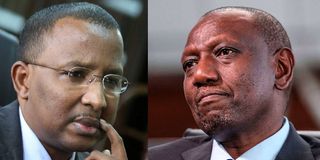
Former Independent Electoral and Boundaries Commission Chairman Ahmed Issack Hassan (left) and President William Ruto.
In the first instalment of the serialisation of Ahmed Issack Hassan’s memoirs, Referee of a Dirty, Ugly Game, the former chairman of the Independent Electoral and Boundaries Commission (2011-2016) tells of tense moments in Kenya’s first polls under new laws in 2013, including what appeared to be a cyberattack on the system relaying presidential election results, pressure from Raila Odinga’s camp and frantic phone calls from William Ruto — Uhuru Kenyatta’s running mate
Voters around the country turned out in large numbers in the 2013 elections, with a record high of 86 per cent, which had never been witnessed before in Kenya. It was indeed a historic election.
It was the first general election after the promulgation of the new Constitution (in 2010) and the first time we were having new elective positions. Kenyans were also optimistic after the commission introduced changes, particularly in technology, that things would be much better this time around.
The success experienced when IIEC (Interim Independent Electoral Commission) conducted the referendum (in 2010) went a long way in building the confidence of many as we got into the 2013 election. Having served as the chairperson of IIEC, and now IEBC (Independent Electoral and Boundaries Commission), I gave Kenyans the assurance I would handle the process equally well.
I believe that I and the commission, to a large extent, were in the good books of those that carried and curated narratives, so much of the reporting was positive.
We agreed with the commissioners that the nine of us would not vote. Each commissioner was to keep tabs with the RECs (Regional Elections Coordinators) in their assigned regions for continuous progress updates. By mid-morning, the commissioners agreed to leave Bomas of Kenya (in Nairobi) to visit the nearby polling centres and observe the progress, then report back by 1 pm.
**
By the time I got back to Bomas, more updates had trickled in from around the country. I spotted Prof Anyang Nyong’o, the ODM Secretary-General and Chief Agent (now Kisumu County governor), heading our way as I got to the commissioners’ lounge. He was in a foul mood, and we soon got to know why.
“Chairman, Jubilee is stealing the elections. They are stealing the elections!” he fumed.
I found out that he had first issued a press statement with the same message before coming to see me in the lounge.
“Professor, I am the returning officer for the presidential election,” I said. “The respective returning officers for the rest of the elective positions are doing their jobs as we speak. I will request you to go and make your complaints in writing, but ensure you include the evidence for each claim.”
**
"Stealing elections"
His complaints were similar to those of Eliud Owalo, the CORD (coalition whose presidential candidate was Raila Odinga) chief agent.
Owalo had been at Bomas earlier in the day to claim that Jubilee had chased their agents out of some polling stations, though once again, without any evidence. He had come to the commissioners’ lounge at about 11 am and made himself comfortable, asking to be served refreshments. It struck me as odd that a chief agent would be seated leisurely in our lounge instead of being somewhere else, working hard for his party.
**
I took to the Bomas podium to address and update the stakeholders and observers as often as I could right through the day. My communication – not just what I said, but how I said it, was crucial. As the face of the election process, and a complicated one at that, I understood the dire need of preserving sobriety, which could easily be shattered during election seasons.

Former Independent Electoral and Boundaries Commission Chairman Ahmed Issack Hassan during the launch of a book titled Bridging Ethnic Divides: A Commissioner's Experience on Cohesion and Integration authored by Alice Wairimu Nderitu launched on April 18, 2018, at the Serena Hotel.
Shumbana Karume, the Head of the Democracy and Elections Assistance Unit in the African Union, who was part of the election observer mission, later pointed out to me that I appeared calm every time I stood at the podium to speak.
My comportment and appearance may have been calm, but deep down, just like a duck, I was composed above water while paddling furiously underneath. I also believe that praying went a long way towards calming both me and the nation.
I never once went to the podium, both during the referendum and in the general election, without first taking time to pray. In addition to asking for guidance and wisdom as I made my speeches, I often said the prayer that Moses made, as quoted from the Holy Quran, Surah Ta-Ha, verses 25 to 28,
‘[Moses) said, “My Lord, expand [that is relax] for me my breast [with assurance], and ease for me, and untie the knot from my tongue, that they may understand my speech.’
**
I went to the podium at 7 pm to give an update on the results tallying process, and to announce the initial presidential results that had trickled in. I addressed an auditorium that was full of expectations, as it was full of people. I began my briefing with words borrowed from the IFES (International Foundation for Electoral Systems) President, William Sweeney.
“Welcome to a celebration of Kenyan democracy.”
**
Provisional results
I clarified that the results of the presidential election I announced were only provisional. The final, official results would be announced when all returning officers brought their respective hard copy results to the Bomas of Kenya.
Provisional results allowed the demand for information to be fed as the Kenyans waited for the official results and enabled them to internalise the progress towards a final outcome.
The results were displayed on a large screen in the auditorium. I was the national returning officer for the presidential election. The others were the 47 county returning officers, the 290 constituency returning officers, and the diaspora returning officers.
Read: IEBC boss Issack Hassan denies team’s role in tender
**
(Mohamed) Alawi (an IEBC commissioner) lingered a little longer when the rest left the Bomas of Kenya, and the IT staff continued monitoring the results transmission. A number of agents also decided that they would stay over for the night to wait for the results. I was about a kilometre away from Bomas of Kenya, on my way home, near Brookhouse International School, when I received a call.
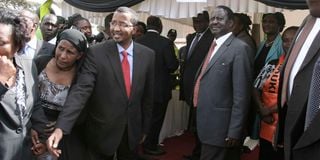
Former Prime Minister Raila Odinga (right) and former IEBC chairman Issack Hassan in Kibera when the ODM leader arrived to register as a voter at Old Kibera registration centre on November 27, 2012.
“Chairman, you must come back to the Bomas Centre immediately!”
“Why? What has happened?”
“Everything has stopped. Something is wrong, Chairman. The transmission of results has stopped!”
I struggled to remain calm as I instructed the driver to turn back and head for Bomas. I then called Alawi to check if he had already left and requested he gets back to the centre. The IT team could not explain why the results transmission had stalled. There was also a new problem.
Rejected votes spike
The number of rejected votes had spiked at an alarming rate. The IT team and Safaricom staff were almost at each other’s necks, exchanging blame for what was going on. We needed to agree on a way forward, and fast.
We held a crisis meeting with Alawi, the IFES team, the commission IT team, Safaricom staff, and the agents of the presidential candidates who were present at that time. We established that the transmission hitch was not on the side of the presiding officers, as many of them confirmed they had sent the messages with the provisional results to the tallying centre.
It was then established that the server transmitting the results had indeed crashed.
By this time, I was receiving numerous messages and phone calls, trying to establish what was happening to the transmission. A week before the day of the election, the commission had confirmed the need for me to remain in direct contact with all eight presidential candidates, as the returning officer for the presidential election.
I kept them updated on our election preparedness and informed them that they could reach me for any inquiries. Presidential candidates were among the numerous callers when the news of the servers crashing broke. They wanted to know what was happening and why the transmission of results had stalled. It was not possible to give any of them an update without first getting a clear report from the team in charge of the transmission.
“Are you sure that we are not victims of a cyberattack?” I asked the IT team.
We needed to know what the problem was and how to proceed from there. We could not afford to jeopardise all the hard work that had been going on for months in preparation for the election, and I could not imagine seeing it all go down the drain. Some of the messages I received, as well as what was now going around on social media, leaned heavily towards the suspicion that we were under attack, and I recall some of them:
‘Chairman, wake up to the reality! You are under attack, a cyberattack for that matter.’ ‘Admit that you have been compromised, chairman and let the country know exactly what is happening.’ ‘The National Intelligence Service has taken over the IEBC servers, leading to the crash.’
(Dismas) Ong’ondi (IEBC director of ICT) sent Mike Yard (the IFES boss who was leading the team working with the electoral commission) to explain what the problem was, with regard to the rejected votes.
Programming error
A software programming error was multiplying every figure from the tally of the rejected votes by a factor of eight. If a certain polling station had 100 rejected votes, they were presented as 800.
Interestingly, this programming error only affected the presidential votes. It sent panic and alarm across the entire country. At some point, in jest, the media started referring to the rejected votes as the ‘third presidential’ candidate.
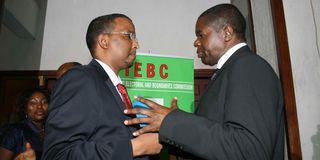
Former IEBC Chairman Ahmed Issack Hassan (left) with ex-IEBC CEO James Oswago on March 17, 2012.
This was because the provisional presidential results showed that Uhuru Kenyatta (the Jubilee presidential candidate) was in the lead, followed by Raila, then the rejected votes closely behind, and finally the rest of the presidential candidates.
Mike Yard and the IT team resolved the hitch, but not before it gained traction on social media. Mike was even ready to address the country to explain what had happened if he was required to, though we did not think it was necessary. As an American, the nuances of what had been said about Kenya by the West, that ‘choices had consequences’ would spill all over the already impatient Kenyans, if he tried to explain a hitch in our electoral systems…
“Please note that the hitches will be fixed and normal transmission will resume for the provisional results,” I said. “However, if the technology we are using does not work at 100 per cent capacity, note that under the law, we are still permitted to have manual copies of the results. We will only announce the winner of the presidential election after the signed copies of the official forms come in from all the constituencies.”
I asked the few observers, agents, and diplomats who were in the auditorium if they had any further questions. Most seemed satisfied with the explanation. Some, however, were still convinced that we were under a Denial of Service (DoS) attack. Maina Kiai was seated in the auditorium right behind the diplomats.
He was a well-known civil society activist and had served as the chairperson of the Kenya National Commission of Human Rights (KNCHR). He stood up and projected his voice:
“Mr Chairman, are you abandoning the ERTS (Election Results Transmission System)?”
He was attempting to undermine the commission by implying that because the ERTS was experiencing hitches, the entire process and results were flawed and lacked credibility. I explained to him and everyone else that the use of ERTS was a valuable addition to the entire process, and the hitches we were experiencing would not interfere with the credibility of the election. Ultimately, we were going to announce the final results after receiving all the hard copy forms from our returning officers across the country.
**
Disk space issue
The ICT team later discovered that the hitch was caused by a disk space issue on one of the servers. (James) Oswago (the IEBC chief executive) mentioned that the issue had been resolved by providing additional capacity on the server that was affected, and that the ICT team was monitoring it closely to ensure optimal performance.
The transmission of results went on well, but by midday on March 5, it stalled again. It was terribly frustrating to be in a place where technical hitches were interfering with the most crucial part of our work.
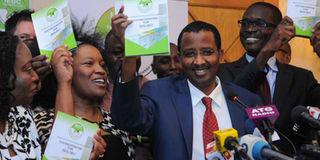
Former Independent Electoral and Boundaries Commission Chairman Issack Hassan (centre) launches the Election Operation Plan 2015-2017 at the Intercontinental Hotel in Nairobi on January 14, 2016.
The IT team could not explain what the issue was, and they began blaming our field staff, claiming that they had not sent the provisional results through the ERTS. On being called, however, the presiding officers confirmed again that not only had they already sent the results, but they had also locked up the equipment and gone home to await the final tally.
**
Ong’ondi, the ICT Director, kept tagging along with Mike Yard for all updates we required from the IT team, and did not seem to be pulling his weight any more. No clear explanations were forthcoming from him. He tried to create a smokescreen by assuring us that everything would be resolved, but his assurances fell flat. The commissioners made a final decision on the matter – to abandon the ERTS.
**
Tension was building across the country, and we were receiving reports of hot spot areas from the National Security Advisory Committee. After the commission made the decision to abandon the ERTS, I called for a press briefing to inform the country that we were now waiting for the 47 county returning officers and the 290 constituency returning officers. They were to come to the Bomas of Kenya with the hard copies of the forms that both they and the political party agents had signed. The forms would be verified before announcing the final results.
Urgency
We instructed all staff who could make it to Nairobi by road in under six hours to do so as a matter of urgency. Those in remote and far-flung areas were airlifted for expediency. ..
Within a day, over 300 staff were at the Bomas of Kenya with all the necessary documents. Immaculate Kassait (now data commissioner), the Director of Voter Registration and Election Operations, organised the officers into ten teams within the tallying centre.
**
I instructed my personal assistant, George Gathuka, to sit in the last group which verified and audited the final tallies. George had joined my office when my previous personal assistant, Noor Awadh, left us to join the legal department of the National Assembly…
Back at Bomas, I wanted George to be my eyes and ears in the last group, though Oswago did not seem too happy with this decision. He felt that I was now micromanaging the process. I disagreed with him, as it was my election as the returning officer for the presidential election. I was prepared to go to any length and apply every measure I could, to ensure that everything went well...
Soon enough, we noticed some mischief among the staff at the tallying centre. The returning officers would submit their results and sign a checklist with the team collecting the documents. However, a few of the hard copies went ‘missing’ without explanation.
Quarrels and misunderstandings ensued since the returning officers could prove from their signatures on the checklist that the documents were no longer in their custody. The recipient staff could not explain why these documents were missing. We were shocked to learn that staff were now taking sides based on their tribal and political affiliations, in the verification process.
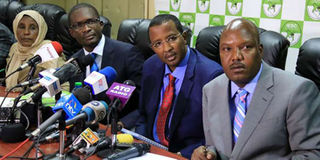
Former Independent Electoral and Boundaries Commission (IEBC) chairman Issack Hassan (second right) addresses the media at the agency's offices in Nairobi on May 5, 2016. He is flanked by former IEBC chief executive Ezra Chiloba (second left) and ex-commissioners Kule Galma Godana and Thomas Letangule.
Those supporting CORD, for instance, would hide forms received from Jubilee strongholds under their tables, and vice versa. These became the ‘missing documents’ in what was referred to in jest as ‘the Bermuda Triangle’ among the commission staff. Thankfully, this was discovered and nipped in good time. Verification was a slow process, so it took some days, and we patiently waited it out.
**
The emotions across the nation were on a seesaw that week. Many Kenyans were already in a celebratory mood after their preferred candidates in the other five elective positions won. The mood across the country was tempered by both jubilation and disappointment.
Incitement
Some of the newly-elected politicians, however, began inciting Kenyans, alluding that IEBC was rigging the presidential election. It was comical listening to their accusations. The same process that had awarded them victory was what they now claimed was rigged.
We even asked some of them whether their win should be cancelled by the commission if they were convinced that we were rigging. James Orengo and Johnson Muthama, who had been elected as Senators for Siaya County and Machakos County respectively, were particularly vocal with this allegation.
“No, no, no! Ours was very good and credible. Lakini hii ni mbaya,” they both said, insisting that the presidential election was flawed.
**
As we waited for the verification to be completed, (Abdullahi) Sharawe (an IEBC commissioner) made a suggestion, which in retrospect may not have been wise. It entailed the interpretation of the 50 per cent plus one vote rule, which the winner of the presidential election was required to have. Sharawe proposed to the commissioners that the total votes cast should include both the valid and rejected votes.
The Constitution provides in Article 138 (4) that, ‘A candidate shall be declared elected as President if the candidate receives (a) more than half of all the votes cast in the election; and (b) at least 25 percent of the votes cast in each of more than half of the counties.’
The contention came up in the interpretation of what constituted the ‘total votes cast’. Were they only the valid votes that had been cast, or did they include both the valid and rejected votes? I had observed the varied interpretations that came with the new Constitution, as many of the new laws still left room for discussion on the literal meaning.
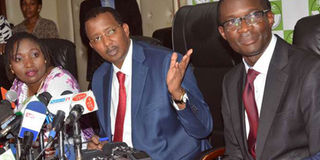
Former Independent Electoral and Boundaries Commission Chairman Issack Hassan (centre), former Chief Executive Officer Ezra Chiloba (right) and former Vice-Chairman Lilian Mahiri-Zaja during a press briefing at the IEBC offices in Nairobi on March 24, 2016.
The commission’s legal department had voiced reservations on the matter. The Director of Legal Affairs, Praxedes Tororey, advised us to work with valid votes cast only. She also recommended that we seek further clarification and legal advice, as it was a sensitive issue. I may have rushed to accept the proposal by Sharawe, and later wished that I had consulted further on the matter.
Eventually, the commissioners resolved that the calculation of the total votes cast would include both the valid and rejected votes, as suggested by Sharawe. This raised the bar much higher for the winner than if the total had been calculated from the valid votes only.
Jubilation and dismay
What I did not anticipate, however, was the reaction by members of the two main political parties when I announced that the final tally for the winner of the presidential election would be calculated from the total of valid and rejected votes. It elicited both jubilation and dismay.
Members of CORD were delighted, and even for a surprising moment, took a break from their criticism of the commission. They were full of praise for the decision and subsequent announcement, saying that the commission was now on the right track, and was even trying to redeem its image. Jubilee members, on the other hand, were furious, and their utterances swiftly acquired a combative tone.
“This is our country. Who is giving you instructions, Mr Chairman? What is wrong with you people?” William Ruto (Mr Kenyatta’s Jubilee running mate in 2013 and current President) fumed when we spoke on phone. “How do you just go about changing the rules when they are clearly outlined in the Constitution?”
He made repeated calls every so often to protest against the decision.
“Our lawyers and our officials who are former commissioners know these things!” he said. “You are just trying to raise the bar so that you can favour CORD members who are using every trick in the bag to see to it that the country goes to a run-off.”
His suggestion about the run-off seemed like a possible eventuality at that point, as the results by then showed Kenyatta in the lead. He was closely followed by Raila. Ruto was relentless in his assertion that we were being influenced by their opponents and the Western envoys in manipulating the outcome of the election. What surprised us, even more, was the response from some of the foreign diplomats. The German Ambassador and the British High Commissioner took sides, and even went as far as giving a press conference, supporting the decision by the commission.
**
In a belated decision, we sought the advice of the Attorney General, Prof Githu Muigai, on the interpretation of what to consider regarding the total votes cast. Election Regulation 77 (1) provided that rejected votes ‘shall be void and shall not be counted.’ The total number, therefore, referred only to the valid votes cast, and not just the votes cast.
Both he and our lawyers were in agreement that the decision and subsequent announcement I made were in error. The total tally for the winner of the presidential election should have been calculated from the valid votes cast only. I had by then already tied my hands, and could not take back my words. We, therefore, decided to work with the status quo and see how things would pan out.
It was a terrible time to have one’s foot in the mouth. But at least I had learnt a critical lesson, which was to consult and seek clarification on legal interpretations before making any further decisions and announcements.
Tomorrow in the Daily Nation The Wild Wild West: Elections drama at Bomas of Kenya





